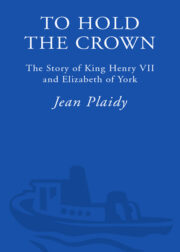But suppose he had a more dazzling proposition to put before the Sovereigns? He sent for de Puebla, a clever man who delighted in intrigue and was not averse to a little sharp practice. He was the sort of fellow who could always be safely sounded out and who for considerations could be counted on to give consideration to every scheme—however shocking it might appear to some.
Henry said: “The Sovereigns are no doubt a little concerned about their daughter’s future.”
“Why, my lord, they know that she is to have Prince Henry. That seems to them a sensible and happy conclusion to the Infanta’s matrimonial affairs.”
“Henry is only a boy, not yet twelve years old. I fancy that the Sovereigns are concerned about waiting for him to come of age before the final ceremony can take place. I have another idea. How would they feel about seeing their daughter Queen of England immediately?”
“My lord!”
“Why not? I am free to marry.”
“And you would take your son’s widow!” Even the worldly de Puebla was taken aback.
“It seems reasonable. Katharine is here. There would not be the expense of bringing her over. She is a widow. I am a widower.”
“I do not know how it would be regarded,” said de Puebla. “But it can be put to the Sovereigns.”
“We could marry almost immediately. I have always held the Princess Katharine in high regard.”
Why, thought de Puebla, she could be in childbed before the year is out . . . she might manage even that. No time wasted between the birth of the little Princess and the birth of the next child even though there had to be a change of queens. Even by de Puebla’s standards there was something very cynical about this king.
“Well?” said the King.
“I will put the notion to the Sovereigns without delay.”
“Do that,” said the King. “We do not wish for unnecessary delay.”
De Puebla could not resist the chance to break the news to Katharine. Moreover he felt that by so doing he might ingratiate himself with her. He wanted to assure her that he was working for her, so he called on her.


"To Hold the Crown: The Story of King Henry VII and Elizabeth of York" отзывы
Отзывы читателей о книге "To Hold the Crown: The Story of King Henry VII and Elizabeth of York". Читайте комментарии и мнения людей о произведении.
Понравилась книга? Поделитесь впечатлениями - оставьте Ваш отзыв и расскажите о книге "To Hold the Crown: The Story of King Henry VII and Elizabeth of York" друзьям в соцсетях.